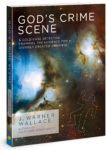
“I’m a Christian ‘Case Maker’ and I can’t even answer every possible question someone might ask. I know other Christians must feel the same way, and they’re probably thinking, ‘If professional apologists can’t answer every question, how can we? And how can we continue to believe something when we have unanswered questions?’
Well, a lot of it comes down to what I call, ‘evidential insufficiency’. Every criminal trial illustrates answers an important question: At what point does a jury think it has enough to make a decision? We have to remind every jury that they’ll always have unanswered questions; in every case. I’ve never had a case where there wasn’t a series of unanswered (and even unanswerable) questions, because you’re never going to be able to answer every question; I don’t care how long you look at the case.
We ask jurors to make a decision in spite of those unanswered questions. As a matter of fact, that’s why the standard of proof in criminal trials is not ‘beyond a possible doubt’; it’s ‘beyond a reasonable doubt’. If the standard of proof was “beyond a possible doubt,” we’d never convict anyone. There are lots of things we believe, even though we don’t have every possible piece of evidence to justify my belief. How can I be certain my car won’t explode when I turn the key? It’s happened to others, and it’s certainly possible it could happen to me. But is it reasonable? If you lived on the basis of your possible doubts, you’d be immobilized by fear and uncertainty. That’s why the standard of ‘beyond a reasonable doubt’ is good for us, even as Christian believers.
We need enough evidence to infer the most reasonable inference, but no more. We can’t answer every question about God. Do you really think, as a mere mortal, you can know everything there is to know about the nature of God? I doubt we’re ever going to have complete, robust answers on this side of Heaven. But we can still move, we can still act, we can still make a decision for Christ, even though we don’t have every possible answer, because guess what? No one has every possible answer, regardless of worldview.
Even when I was an atheist, I couldn’t tell you how the universe came into being, how life originated in the universe, how to explain the existence of consciousness or free will, and I also had many other unanswered questions. I wasn’t alone; some of the best atheist philosophers and scientists cannot offer answers to those questions either. Yet, they are comfortable in their worldview, even though they have unanswered questions. I think, as Christians, we need to recognize that Christian Theism is the best inference from evidence, and learn to become comfortable with those few unanswered questions we might still have. The Christian worldview has fewer unanswered questions than any other worldview.”
This brief answer was modified from my interview with Bobby Conway. To learn more and watch many other short answers to difficult questions, please visit the One-Minute Apologist website.

J. Warner Wallace is a Dateline featured Cold-Case Detective, Senior Fellow at the Colson Center for Christian Worldview, Adj. Professor of Christian Apologetics at Talbot School of Theology, Biola University, author of Cold-Case Christianity, God’s Crime Scene, and Forensic Faith, and creator of the Case Makers Academy for kids.
Subscribe to J. Warner’s Daily Email
Save
Save
Save
J. Warner Wallace is a Dateline featured cold-case homicide detective, popular national speaker and best-selling author. He continues to consult on cold-case investigations while serving as a Senior Fellow at the Colson Center for Christian Worldview. He is also an Adj. Professor of Christian Apologetics at Talbot School of Theology, Biola University, and a faculty member at Summit Ministries. He holds a BA in Design (from CSULB), an MA in Architecture (from UCLA), and an MA in Theological Studies (from Gateway Seminary).
































